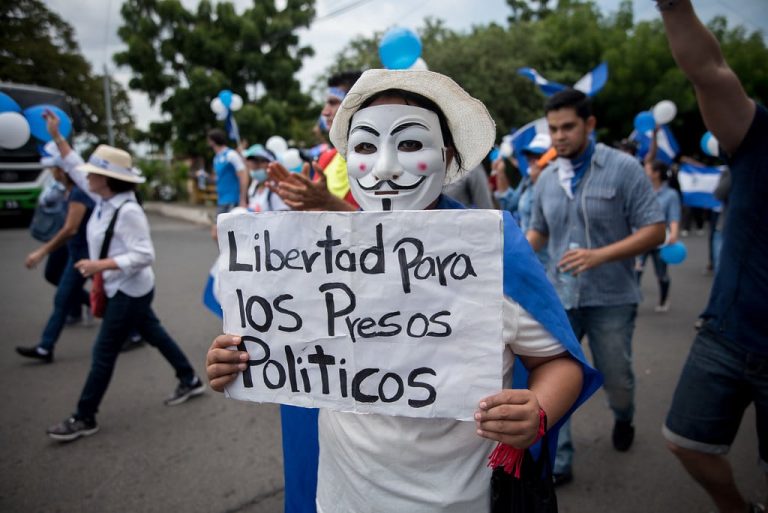30 de diciembre 2022

Ortega Grants Chinese Company a Huge Mining Concession

PUBLICIDAD 1M
PUBLICIDAD 4D
PUBLICIDAD 5D
The latest “special visits” to the political prisoners reaffirm the capricious and arbitrary way the regime treats the political prisoners

In the last few weeks, the Ortega-Murillo regime has authorized “special visits” to the political prisoners, allowing their young children to have contact with their parents for the first time, after a year and a half in prison. To a certain extent, these visits have counterbalanced the innumerable news articles regarding the conditions and outrages that the political prisoners in Nicaragua have suffered, although the final balance is negative. What implications do these visits have from the perspective of human rights?
Paradoxically, they reaffirm the capricious and arbitrary manner in which the regime treats the political prisoners. That is, it reflects the fact that – beyond mere influence – the leaders of the Ortega-Murillo regime completely control the prison conditions of these people. Decisions aren’t made according to the rights recognized by the law, nor as a consequence of judicial and/or prison supervision. Instead, the regime itself, in an act of indulgence or compassion, has allowed these visits. Similarly, it’s the regime itself that has permitted and authorized all the violations to the human rights of these imprisoned individuals.
Daniel Ortega and Rosario Murillo were the ones allowing business leader Jose Adan Aguerri to be remanded to house arrest, and the ones who later took that right away. [Aguerri was sent back to prison on November 9.] It’s very important to highlight this, for the legal effects it triggers. First, in establishing the systematic context of why these detentions comprise a crime against humanity and defining the chain of command in this. Secondly, in the specific case of Nicaragua, for demonstrating the condition of special subjugation that characterizes those deprived of their freedom. The latter has become a significant variable in the activation of locus standi, the international law provision that grants all peoples the right to activate international bodies as a last resort, in order to be heard.
The international commitments on human rights that Nicaragua has signed indicate that, when there’s a concurrence of certain circumstances that violate human rights, the victims can appeal to the international bodies in search of justice. Let’s consider, for example, how a petition to the Inter-American Commission for Human Rights (IACHR) can be activated. The first condition (with certain exceptions) is that all internal resources for justice must have been exhausted within the six months preceding the appeal for international aid. In other words, if a political prisoner has been found guilty and sentenced in violation of due process, and the sentence has continued in place after all legal resources have been exhausted, the victim then has a deadline of six months to lay out their case to the IACHR.
Does this mean that six months after a political prisoner has been notified of the results of their appeals, they can no longer petition the IACHR for violations of their human rights? Not at all. The basic premise here is that individuals deprived of liberty are considered an especially vulnerable group, because of their complete subjection under the government. That they can’t guarantee their basic needs through their own means. Added to that is the enormous discretionary leeway that exists in the case of the Nicaraguan political prisoners, making themselves and their families possible targets of reprisals.
Another element to consider is that while the incarceration persists and their human rights continue being violated, there’s a permanence of violation. As such, the time limit for activating locus standi is suspended. The national and international human rights organizations find themselves with their hands tied by the fears of the political prisoners’ relatives that the regime will take reprisals against them or their loved one if they press forward with an international case. That fear is not only natural, but totally understandable in the current context of Nicaragua. For that reason, the international demand to respect the human rights of the political prisoners in the country must be rethought.
A legal definition stating that the Nicaraguan political prisoners are suffering continuing violations of their human rights could form a strategy for international litigation. Establishing this as a general condition will – in the first place – fend off any direct reprisals the regime could take against any individual who raises a demand before international bodies like the IACHR. Secondly, once this is accepted by international bodies like the IACHR, it becomes a significant aid to the advance of international human rights protections, in the face of the substantial collapse of democratic institutions that usually accompanies the commission of crimes against humanity.
This article was originally published in Spanish in Confidencial and translated by Havana Times
PUBLICIDAD 3M
Abogado nicaragüense, máster y consultor independiente en Derechos Humanos, radicado en México.
PUBLICIDAD 3D